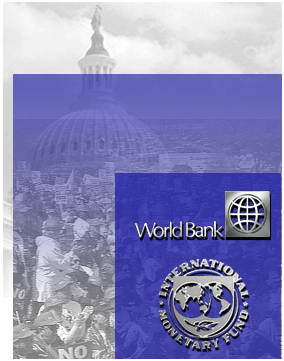 Japan and Stiglitz Spice Up World Bank Parley
Japan and Stiglitz Spice Up World Bank ParleyBy Willhemina Wahlin
(pic: PBS News Hour)
What do Japan and the US economic rebel Joseph Stiglitz have in common? For one, they have both, at one time or another, challenged the fundamental economic philosophy on which the World Bank bases its policies. They are also, ironically, two of the most prominent contributors to this month's World Bank ABCDE Conference, which will be held in Tokyo on the 29 and 30 May. Along with some of Japan's most important economists, Stiglitz himself will be one of the special keynote speakers. In a world full of dry, dull conferences, the ABCDE Conference is beginning to look a little spicy.
Japan has an interesting history with the World Bank. According to Dr. Kaoru Natsuda, a Political Economist and Official Development Assistance Consultant with Ernst & Young ShinNihon in Tokyo, Japan and the World Bank have disputed the role of the state in economic development since the 1980s. "Japan in the past has traditionally believed that the role of the state is important in economic development, and has worked in close collaboration with industry to increase Japanese corporations' international competitiveness. The World Bank, on the other hand, has based its policies on neo-liberalism, nowadays known as the Washington Consensus, which is essentially a free market approach, where the role of the state is reduced to the absolute minimum." In other words, Japan believes that to run an economy effectively, government and business do better when they work together, an idea to which the World Bank was hostile.
This dispute came to a head in 1989, when the World Bank criticized the 'two-step' loans of Japan's Overseas Economic Cooperation Fund (OECF, now Japan Bank for InternationalCooperation - JBIC). These loans, set at below the market rate of the time, jeopardized the status quo that both the International Monetary Fund (IMF) and the World Bank had developed as two the most powerful lending bodies in the world. While OECF may have eventually compromised by re-setting the loans at market rates, the incident provided another spark of opportunity forJapan. Providing the World Bank with US$2.2 million, which almost matched the cost of the World Development Report, Japan funded the East Asian Miracle studies in 1992. This culminated in one of the most important acknowledgements of Japan's economic philosophy, with the publishing of "The East Asian Miracle: Economic Growth and Public Policy" report in September 1993. The report acknowledged the policy management success of Japan, making special mention of the positive role government had in economic development. One of the authors was none other than Joseph Stiglitz.
Stiglitz, a Nobel laureate in economics (2001) and a Columbia University Professor, was Senior Vice President and Chief Economist at the World Bank from 1997-2000, when it is rumoured the US Treasury pushed him out of the position. Prior to that, he was Chairman of the White House Council of Economic Advisors during the Clinton Administration. He is probably best known for his 2002 book, "Globalization and its Discontents," which criticized the policies of the IMF and, to a lesser extent, the World Bank. The book outraged the IMF, with its Chief Economist at the time, Ken Rogoff, writing a scathing open letter to Stiglitz. According to the "Observer's" Faisal Islam, the open letter actually helped to push up sales of the book. "In Globalization, he [Stiglitz] documented the IMF hit squads that decided a nation's spending priorities from the comfort of five-star hotels," wrote Islam, adding that, a year later, with Rogoff as one of its authors, the IMF published a report "which concluded that countries that follow IMF suggestions often suffer a 'collapse in growth rates and significant financial crises.'"
Prof. Stiglitz has gone on to write numerous books on international economic philosophy, proving what some might call a logical approach to development, the latest being "Fair Trade for All." Co-authored with Andrew Charlton, they write, "while increased trading opportunities are good for developing countries, liberalization needs to be managed carefully - the task is much more complex than the simple prescriptions of the Washington Consensus, which blithely exhorts developing countries to liberalize their markets rapidly and indiscriminately."
In another irony of this tale, Japan, under the auspices of Koizumi, has been shifting its view on the role of the state in recent years. His forceful mandate of privatization and deregulation has moved Japan's economy much closer to the ideals of the World Bank. At the same time, some Japanese economists are becoming alarmed at the increasing gap between rich and poor as a result of these policies. On the 1 February this year, Koizumi responded to such criticisms, saying, "a gap between rich and poor within a society is not a bad thing."
While all of these philosophies may seem a world away from the lives of us here on the ground, there has, in fact, been no time in history when more ordinary people have taken an interest in global trade and economics, and it is beginning to have an impact on gatherings such as the ABCDE Conference. Is it possible that there are rumblings within the World Bank itself to move towards more equitable agreements for Developing nations? Like any monolith, those movements are slow-paced, but the outcome of this conference will be well worth keeping tabs on.
 This article was orginally published as Issue 367 of the JIN Newsletter for Japan Inc. Magazine on 12 May, 2006.
This article was orginally published as Issue 367 of the JIN Newsletter for Japan Inc. Magazine on 12 May, 2006. www.japaninc.com


Comments